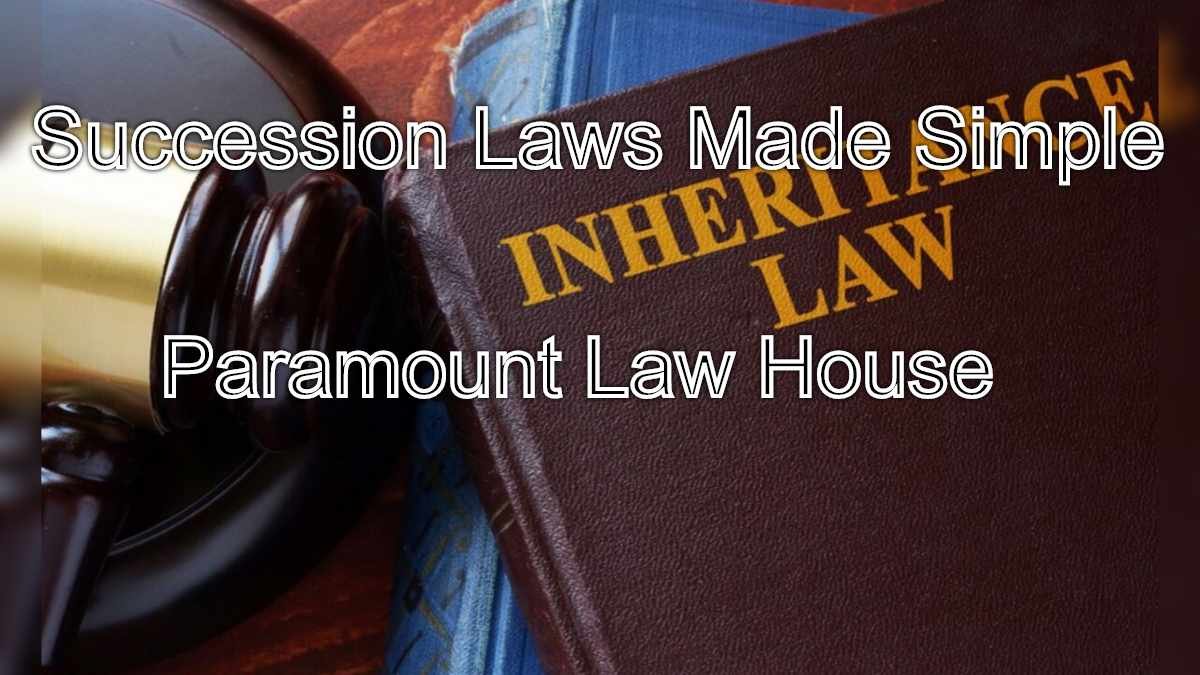Succession Laws Made Simple: Planning for the future is a wise and responsible decision. However, navigating the intricacies of inheritance and property transfer can be daunting. This is where understanding succession laws becomes crucial. Paramount Law House, a leading legal practice, is here to help you simplify this process.
Succession Laws Made Simple: Navigating Property Transfer with Paramount Law House
What are Succession Laws?
Succession laws dictate how property and assets are distributed upon a person’s death, also known as intestacy. These laws ensure a smooth and legal transfer of ownership, minimizing potential disputes and complexities for loved ones.
The Two Main Types of Succession
In India, there are two primary ways property is distributed after death:
- Testate Succession: This occurs when the deceased leaves a valid Will outlining their wishes for asset distribution. A Will allows for greater control over how your property is distributed and can minimize confusion for beneficiaries.
- Intestate Succession: This applies when a person dies without a valid Will. In this scenario, the distribution of assets is governed by the specific succession laws applicable to the deceased’s religion or community.
Understanding Intestate Succession Laws
While a Will offers greater control, understanding intestate succession laws is also important. Here’s a simplified breakdown:
- Hindu Succession Act, 1956: This act governs intestate succession for Hindus, Buddhists, Jains, and Sikhs. It outlines the order of inheritance for surviving spouse, children, parents, and other relatives.
- Indian Succession Act, 1925: This act applies to intestate succession for Christians, Parsis, and Jews. It follows a similar structure to the Hindu Succession Act, outlining the order of inheritance for surviving spouse, children, parents, and blood relatives.
- Muslim Personal Law: Inheritance for Muslims in India is governed by their religious personal laws. These laws differ from the aforementioned acts and have specific rules regarding inheritance for spouses, children, and other family members.
Benefits of Having a Will
While intestate succession laws provide a framework, having a Will offers several distinct advantages:
- Control over Distribution: A Will allows you to specify exactly who inherits your property and in what proportions. This can help avoid potential disputes among beneficiaries.
- Appointment of Guardians: A Will allows you to appoint guardians for minor children, ensuring their well-being and proper management of inherited assets.
- Clarity and Minimizing Conflict: A Will minimizes confusion and potential conflict among loved ones by clearly outlining your wishes for property distribution.
Paramount Law House: Your Trusted Guide in Succession Planning
Paramount Law House, with a team of experienced lawyers, can guide you through the complexities of succession planning. Here’s how they can assist you:
- Will Drafting & Review: Our lawyers can assist you in drafting a clear, comprehensive, and legally sound Will that reflects your wishes for property distribution.
- Succession Planning Strategies: They can discuss your specific circumstances and help you develop a comprehensive succession plan that considers your assets, family dynamics, and tax implications.
- Estate Administration: In the event of your passing, the team can handle the legal aspects of estate administration, ensuring a smooth and efficient transfer of assets to your beneficiaries.
FAQs on Succession Laws and Wills
1. What happens if I die without a Will?
If you die intestate, your assets will be distributed according to the applicable succession laws based on your religion or community. This might not align with your wishes, potentially creating confusion and conflict among family members.
2. Can I change my Will later?
Absolutely! You can modify your Will at any time to reflect changes in your circumstances or wishes. Succession planning can feel overwhelming at the outset, but with the right guidance and support readily available, you can streamline it into a clear and manageable process.
3. How much does it cost to create a Will?
The cost of drafting a Will can vary depending on the complexity of your estate and the lawyer’s experience. Paramount Law House offers competitive rates and transparent pricing structures.
4. How can I contact Paramount Law House?
Scheduling a consultation with Paramount Law House is a simple and valuable first step. You can reach out through their website, phone number, or email address as listed on their contact page.
Conclusion
While succession planning can initially appear daunting, with the right guidance and support, it can be transformed into a straightforward and manageable process. Paramount Law House empowers you to navigate the complexities of succession laws and create a plan that ensures your wishes are respected, and your loved ones are well-provided for after your passing. Don’t hesitate to contact them – they are committed to helping you achieve peace of mind through proper succession planning.
Read More
- Contact Paramount Law House: Top Property Lawyers in Chennai
- Commercial Real Estate Law: Expert Property Attorneys
- Building Plan Approval: How to find the Best Real Estate Property Lawyers 24/7?
- Transfer of Property to Legal Heir after Death: Legal Guidance
- Facing DRT Case in Chennai? Expert Debt Recovery Tribunal Lawyers
- Ministry of Law and Justice, Government of India:

